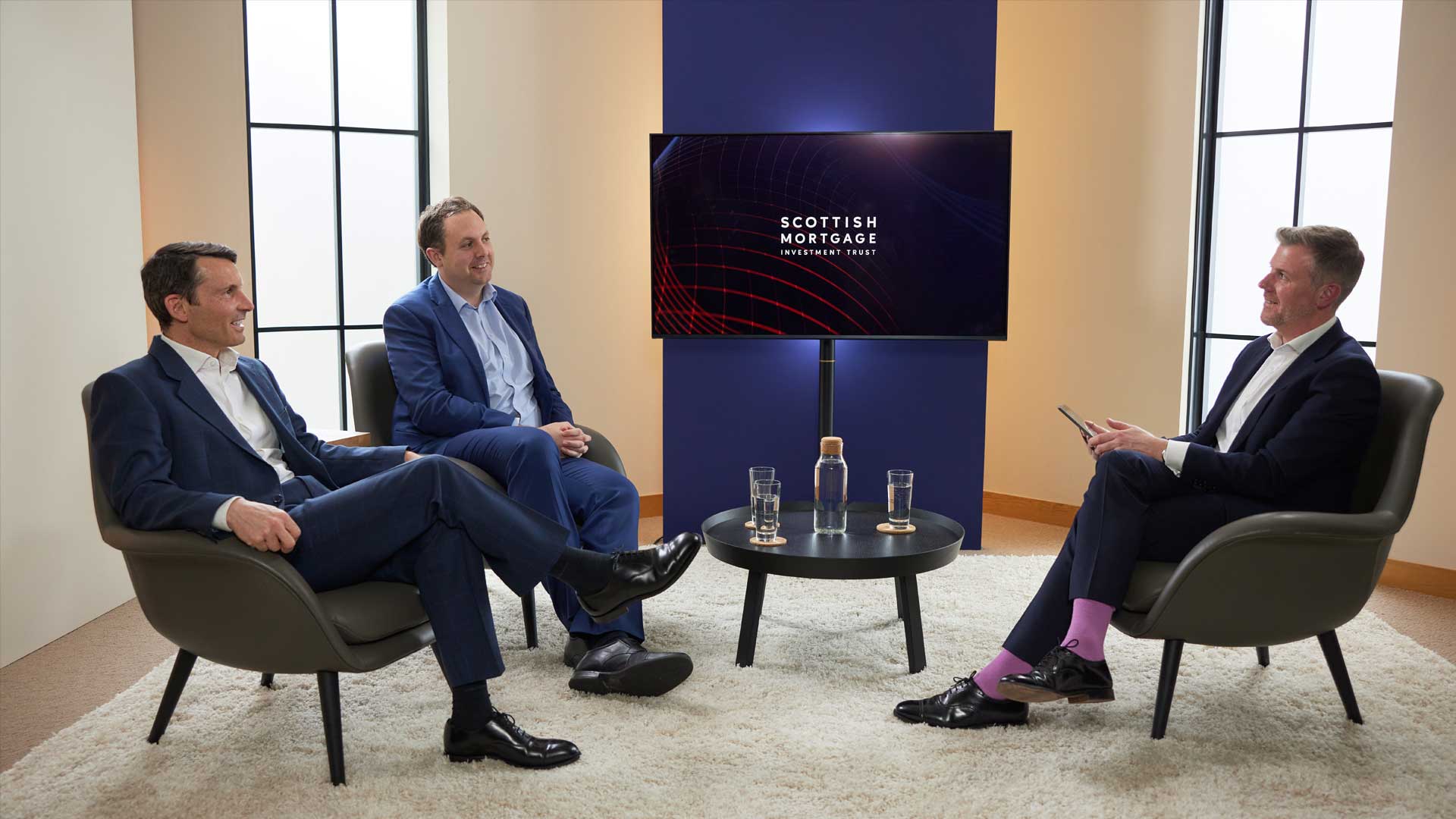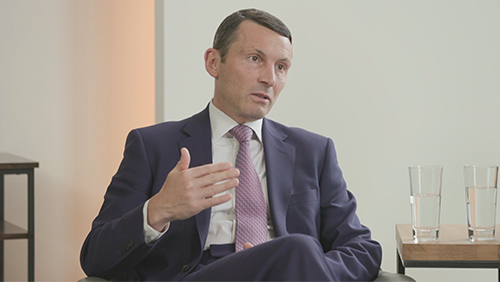May 2019
Article
Managers’ review
James Anderson – Investment manager
James Anderson explains why Scottish Mortgage’s portfolio makes him optimistic about the future, despite the sound and fury of recent headlines.

All investment strategies have the potential for profit and loss, your or your clients’ capital may be at risk.
It’s been a year ruled by sound and fury. From trade wars to Brexit, political arguments were rife and unedifying. By October it was thought that the US economy was overheating and that interest rates would therefore have to rise substantially. But by our March year end, bond yields had reversed course and fallen sufficiently to provoke forecasts of imminent recession. Global stock markets have been equally emotional. We’ve moved from the worst December falls in American equity markets since 1931 to their best quarterly performance for a decade. Not to be outdone, Chinese stocks have risen by almost a quarter in 2019, yet this leaves the Shanghai market below its level of 12 months ago.

The evolution of the Scottish Mortgage portfolio
On the surface there has been little change in Scottish Mortgage’s portfolio in the last twelve months. Of the top thirty holdings last year we still own 28. The two that we have sold, BASF and Svenska Handelsbanken, have been replaced because the opportunities opening up to us in the unquoted realm seem to offer more compelling growth potential rather than out of disappointment at their conduct of affairs. Amongst our top ten quoted stocks, which exert a crucial influence given that they sum to just over half of the assets, the sole change has been the rise of Netflix at the cost of Baidu. The former has been driven by stock outperformance whilst we have reduced Baidu as, for once, we share the market concern that the group is squandering broader opportunities in the Chinese internet in the desire for unduly tight managerial controls.
But beneath the apparent stability there has been a step change in our commitment to venture capital, which we believe matters considerably for our future prospects, deeply differentiates Scottish Mortgage from its peers and requires nuanced explanation. Given that the percentage of assets in our unquoted equities has only increased from 15 per cent to 17 per cent and the attention we paid to reporting on these assets at the half-year stage, it may appear that we are becoming excessively focused on this segment but this underestimates its structural importance. Currently 34 per cent of the assets started out as investments in private companies, even if some of those are now public. Up until now we have been reluctant to stress this area too heavily because our own education in venture capital was incomplete. We have now become more convinced in our abilities and advantages in this comparatively new and different area. In fact, we’re thrilled with what we have learnt. Our opportunity is greater than we initially perceived. It’s our responsibility to take advantage of this favourable combination of circumstances.

The starting point is that we have outstanding access to unquoted companies across the world. This may be illustrated by some of our new purchases in the last twelve months. The only unquoted holding amongst our top ten overall is Ant Financial, which amongst other attributes runs both Alipay, the largest global mobile payments platform and Yu’e Bao, the world’s largest money market fund. Our access came about through our faithful ownership of Ant’s parent Alibaba from the days it too was a private company. Similarly our recent purchase of a holding in SpaceX would have been unimaginable without our patient, controversial and unashamed backing of Tesla. Perhaps we need to move on from pride in being a rare truly global fund to embarrassment at being so limited in our ambitions.
But lest it be thought that our unquoted portfolio is solely a reflection of our committed ownership of public companies it may be worth citing another area where we have substantially increased our exposure in the past year. This is the crossover between genomics and large scale, but individual, data observation in healthcare. Although Flatiron, one of our initial forays in this direction, was purchased by Roche in early 2018, its continued progress illustrates the reality of clinical utility in this area. We’ve added holdings in Tempus and Recursion that are emblematic of accelerated efforts and medical hope through such techniques.
Our purpose in unquoted equities goes further than obtaining access to a new universe of opportunity for our shareholders. We are doing so at a cost that is structurally lower than that available elsewhere. We ask no higher fee for incorporating unquoted equities. The overall ongoing charges of 0.37 per cent compares with a still normal level of 2 per cent and 20 per cent carried interest for venture capital funds. This matters to us and we hope to our shareholders.
Our appeal to companies is equally distinctive. Most venture capitalists demand an exit as their funds near the end of their ten-year life. In turn many companies seek to go public to satisfy this need for liquidity. We feel no need to encourage companies to move to an Initial Public Offering (IPO) prematurely. But if an IPO is the eventual outcome then our preference, subject to business progress, is to buy more shares at that stage both for Scottish Mortgage and frequently for other portfolios managed by Baillie Gifford that are unable to make investments until a company is public.
This willingness to own companies regardless of their status as private for the long term, on the verge of an IPO, or as fully fledged public companies is a cornerstone of our policy. We believe it is a damaging narrowing of the necessarily limited opportunity set of potentially great growth stocks to confine ourselves to public companies at a time when the necessity to be quoted is unclear and the pressures of being so all too evident.
As owners we are structurally neutral as to the best status whilst listening to the arguments for each unique company in which we invest. Whatever the conclusion we try to bring attitudes more typical of venture capitalism to all our investments. We believe that patient support – especially at the inevitable moments of struggle – is better than hurried exit. We believe that our success in quoted as well as unquoted stocks will continue to be dependent on a small number of extreme winners rather than a parade of the slightly above average.
Growth investing
Whilst we aspire to special, potentially unique, advantages in unquoted equities our approach to all our investing is consistent and in line with our core beliefs as set out once again in our annual report. Plainly these contentions are based on our convictions around extreme outcomes and the attractions of high growth investing.
It has been an investment commonplace for long decades that growth investing is a chimera. Value investing, especially as articulated by Warren Buffett, has risen to the status of the one true faith. Yet over the last decade growth indices have substantially outperformed their value counterparts. Moreover this trend has principally been driven by the shares of a cohort of major internet platforms that have defied all predictions of doom based on the strains of growth from an already large base or assumptions of a short competitive advantage period.
What is critical now is to analyse whether this pattern of the last decade is just a chance occurrence, defying eternal verities, or whether it is the outcome of structural changes in corporate affairs and economic structures that find their natural echo in stock markets. We contend that it is the latter. There were two central reasons why the broad genre of value investing outperformed growth in the past. The first was that for all the vicissitudes of cycles and products over time average companies survived and endured. Now they die. Their demise is usually at the hands of technologically driven business models.
Secondly, growing companies did not scale satisfactorily. Returns tended to decline as complexity and asset bases grew in search of increasingly marginal customers. Compounding growth was therefore both hard and dragged down profitability. But in increasing portions of the modern economy this is no longer true. Instead the pattern of increasing returns to scale is more and more evident. Ultimately this isn’t hard to understand: for a software or internet company the initial product introduction is expensive and success uncertain but at scale each new customer is often close to costless after adoption and profitability surges. Gaining new customers frequently becomes easier as network effects prevail. In retrospect investors ought to have grasped the dawning of a new age as long as thirty years ago. This model was pioneered at ever increasing scale by Microsoft. It’s yet to be destroyed there despite substantial managerial missteps or the extraordinary size of the company.
Far from increasing returns to scale being a temporary and limited facet of the economic conditions of today, we suspect that such characteristics will persist and subsume ever increasing areas of the global economy. Healthcare and transportation may be the next sectors to be transformed in this manner as their own forms of data and software emerge. Traditional models will find it hard to cope with such revolutions. More and more of the traditional giants of the world economy and the value universe will therefore fail. They will not revert to the mean as has been the assumption.

Future prospects
It’s traditional to end reports such as this with a list of events and conundrums that preoccupy headline writers and then to move on to a prediction as to the market response over the next year.
We shouldn’t be tempted by either habit. There will always be difficulties and uncertainties. Mostly they pass. They are then succeeded by others that appear equally worthy of fascinated minute by minute attention. But it is the underlying rhythm of scientific advance, of increased knowledge on a global scale and the associated development of great business models that ultimately powers sustainable increases in the prices of special equities. This process requires decades. In any 12-month period, news flow and emotions will contribute to unknowable outcomes. If we are to be of use to our shareholders then we need to concentrate on the beneficial trends of decades not the specifics of the current preoccupations of the moment.
Scottish Mortgage Annual Past Performance
| 2015 | 2016 | 2017 | 2018 | 2019 |
| 29.6% | -0.7% | 40.9% | 21.6% | 16.5% |
Source: Morningstar, share price, total return.
Past performance is not a guide to future returns.
Risk factors
The trust invests in overseas securities. Changes in the rates of exchange may also cause the value of your investment (and any income it may pay) to go down or up.
The trust has a significant investment in private companies. The trust’s risk could be increased as these assets may be more difficult to sell, so changes in their prices may be greater.
The trust invests in emerging markets where difficulties in dealing, settlement and custody could arise, resulting in a negative impact on the value of your investment.
About the author - James Anderson
Investment manager
James was the manager and then joint manager of Scottish Mortgage Investment Trust between 2000 and 2022. He was also a co-manager of the International Concentrated Growth and Global Outliers Strategies. James chaired the International Growth Portfolio Group from its inception in 2003 until July 2019 and was also Co-Manager of Vanguard International Growth. In 2003, James co-founded our Long Term Global Growth Strategy. Before that, he headed our European Equity team. James served as a member of the Advisory Board of the government-sponsored Kay Review and as Chair of the subsequent industry working group that set up the UK Investor Forum. He joined Baillie Gifford in 1983 and became a partner in 1987. James graduated BA in History from the University of Oxford, and after postgraduate study in Italy and Canada, he gained an MA in International Affairs in 1982. James is currently a Trustee of the Johns Hopkins University and Chairman of the Swedish investment company Kinnevik.
Important information
This communication was produced and approved at the time stated and may not have been updated subsequently. It represents views held at the time of production and may not reflect current thinking.
This content does not constitute, and is not subject to the protections afforded to, independent research. Baillie Gifford and its staff may have dealt in the investments concerned. The views expressed are not statements of fact and should not be considered as advice or a recommendation to buy, sell or hold a particular investment.
Baillie Gifford & Co and Baillie Gifford & Co Limited are authorised and regulated by the Financial Conduct Authority (FCA). The investment trusts managed by Baillie Gifford & Co Limited are listed on the London Stock Exchange and are not authorised or regulated by the FCA.
A Key Information Document is available by visiting our Documents page.
Any images used in this content are for illustrative purposes only.






